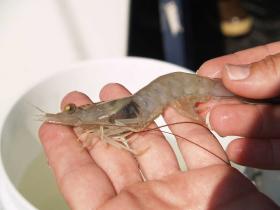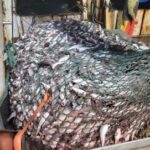Tag Archives: Black gill disease
Black gill disease shows up early in Georgia shrimp
 “We’re seeing 40 percent of our white shrimp infected,” said Pat Geer, chief of fisheries at the Georgia Department of Natural Resources. “We have never seen that before. Ever. So why, why are we seeing it that much earlier?” Geer put that question to a gathering of researchers, shrimpers and fisheries managers from Georgia and South Carolina on Wednesday at the University of Georgia Aquarium at Skidaway. Though unattractive, black gill shrimp are safe to eat. The discoloration is a result of a parasite that infects the gills. When it does, that tissue reacts by producing melanin, resulting in the tell-tale blackening. Researchers have determined the culprit is a ciliate, a single-celled organism with hair-like structures that propel it, but they haven’t been able to nail down which species it is. Read the story here 15:12
“We’re seeing 40 percent of our white shrimp infected,” said Pat Geer, chief of fisheries at the Georgia Department of Natural Resources. “We have never seen that before. Ever. So why, why are we seeing it that much earlier?” Geer put that question to a gathering of researchers, shrimpers and fisheries managers from Georgia and South Carolina on Wednesday at the University of Georgia Aquarium at Skidaway. Though unattractive, black gill shrimp are safe to eat. The discoloration is a result of a parasite that infects the gills. When it does, that tissue reacts by producing melanin, resulting in the tell-tale blackening. Researchers have determined the culprit is a ciliate, a single-celled organism with hair-like structures that propel it, but they haven’t been able to nail down which species it is. Read the story here 15:12
South Carolina and Georgia shrimpers brace for black gill
 While Lowcountry shrimpers have seen little of their catch infected with black gill disease this year, scientists say it’s only a matter of time. The infection, which causes dark spots to appear on the midsection of shrimp, is not dangerous to humans. It remains somewhat of a mystery to scientists and shrimpers, but some of them blame it for reduced shrimp population in recent years. Charles Gay of Gay Fish Company on St. Helena Island said his shrimpers began seeing black gill this week. Read the rest here 13:24
While Lowcountry shrimpers have seen little of their catch infected with black gill disease this year, scientists say it’s only a matter of time. The infection, which causes dark spots to appear on the midsection of shrimp, is not dangerous to humans. It remains somewhat of a mystery to scientists and shrimpers, but some of them blame it for reduced shrimp population in recent years. Charles Gay of Gay Fish Company on St. Helena Island said his shrimpers began seeing black gill this week. Read the rest here 13:24
Parasite depletes wild shrimp haul off southeast Atlantic coast

Georgia shrimpers planning to petition for disaster status – Black gill disease – up to 90 percent of the shrimp have been infected.
 And they’re looking for answers to what’s devastating the catch from Charleston to Jacksonville, a shrimp disease called black gill. The condition, in which shrimp develop black spots on their gills, first showed up in Georgia shrimp in the 1990s. Since then it’s waxed and waned, but the last several years have been bad ones, shrimpers say. This year up to 90 percent of the shrimp in some trawls have been infected. more@independentmail 09:22
And they’re looking for answers to what’s devastating the catch from Charleston to Jacksonville, a shrimp disease called black gill. The condition, in which shrimp develop black spots on their gills, first showed up in Georgia shrimp in the 1990s. Since then it’s waxed and waned, but the last several years have been bad ones, shrimpers say. This year up to 90 percent of the shrimp in some trawls have been infected. more@independentmail 09:22











































